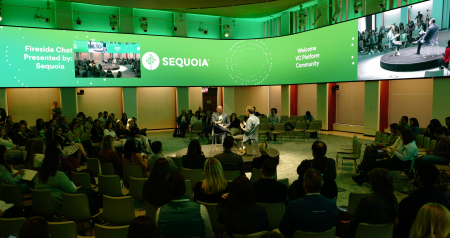
From Lead to Superfan — AI Event Strategies for the Complete Customer Journey
Crafting event strategies that prioritize human connections is essential for AI communities.
Combining advanced technology with human-centric approaches enables brands to foster genuine engagement and build lasting relationships with their audiences.
We delve into the challenges faced by event professionals in AI communities and offers actionable strategies to overcome these obstacles through humanized event experiences. By integrating strategic touchpoints at every stage of the customer journey, tech brands and startups can create more meaningful and impactful interactions, transforming how audiences perceive and engage with AI technologies.
What are your key challenges?
Tech brands and AI start ups often encounter a range of challenges that can significantly impact the success and engagement of their marketing. Understanding these challenges allows the development of effective strategies to overcome them. Here are some common challenges that Team Happily has seen:
Small, Targeted Events — Crafting intimate, meaningful engagements tailored for specific accounts can be difficult, especially when aiming to provide value and foster deep connections.
Booth Attraction — In larger events, standing out and drawing attendees to specific booths requires innovative approaches to maximize engagement and make a lasting impression.
Brand Awareness — Building recognition and trust in a competitive AI landscape involves consistent, strategic branding efforts to differentiate and position the brand effectively.
Tech Adoption — Encouraging the transition from manual processes to technological solutions necessitates demonstrating clear benefits and ease of integration to overcome resistance.
Hybrid Engagement — Balancing and effectively engaging both virtual and in-person audiences in hybrid event formats poses logistical and experiential challenges, demanding creative and flexible solutions.
Niche Markets — Reaching and engaging narrow, niche audiences with limited brand recognition requires targeted marketing and personalized content to resonate and build a loyal community.
Where is your customer in their journey?
Mapping the customer journey involves recognizing the different stages where your customers might be and tailoring your approach to meet their needs effectively. Each stage represents a unique mindset and set of requirements that need to be addressed to guide customers smoothly through the journey.
1. Demand Generation — At this initial stage, potential customers are unaware they have a problem. The goal here is to educate and inform them about the challenges they face and how your solution can help.
2. Lead Generation — Customers at this stage recognize their problem and are actively seeking solutions. They are gathering information and comparing options, making it important to highlight the benefits and advantages of your offerings clearly.
3. Customer Engagement — Once customers have chosen your solution, they need continuous engagement to feel valued and supported. This stage focuses on building a strong relationship through excellent customer service, regular updates, and personalized interactions.
4. Superfan Creation — Transforming satisfied customers into brand advocates involves creating exclusive experiences and nurturing relationships. By providing exceptional value and unique opportunities, you can turn loyal customers into passionate promoters of your brand.
For more watch our Happily Webinar on demand, Humanizing Event Strategies for AI Communities.
Example — the customer journey of 'Kyle'.
By identifying and addressing these aspects at each stage, brands can create tailored experiences that move customers through the funnel effectively.
1. Current Solution — Kyle finds his workflow tedious and seeks a time-saving tool. His dissatisfaction with current processes drives their search for better solutions.
2. What They Know — Kyle knows tools exist but is unsure which is best. They are exploring options and needs clear, comparative information to make an informed choice.
3. What They Value — Kyle prioritizes ease of use and a friendly experience. Highlighting user-friendly features and positive user testimonials will resonate with them.
4. Where They’ll Go — Kyle will seek solutions that are easily accessible and well-reviewed. They will likely visit reputable websites, read reviews, and attend demonstrations or webinars.
5. How They Convert — Kyle will convert based on a product that is friendly, approachable, and integrates seamlessly into their life. Providing personalized trials, easy onboarding processes, and exceptional customer support will facilitate their decision to adopt the new tool into their daily life.
For more watch our Happily Webinar on demand, Humanizing Event Strategies for AI Communities.
The right event for the right goal.
Implementing touchpoints in event strategies is crucial. Each type of event serves a unique purpose and aligns with specific goals, enhancing engagement and achieving desired outcomes. Here’s how to match the right event type to your goals.
-
Summits — Ideal for large gatherings, summits facilitate deep dives into complex topics, fostering extensive discussion and networking among participants.
-
PR Stunts — Creative and eye-catching, PR stunts draw significant attention and generate buzz around your brand or product.
-
Booths— Interactive spaces like trade show booths engage attendees through hands-on experiences and direct human interaction with your brand, and your team.
-
Dinners and Receptions — These personal networking opportunities allow for more intimate conversations and relationship building in a relaxed setting.
-
Webinars — Online sessions are perfect for reaching a broad audience, providing valuable information and demonstrating expertise in a convenient format.
-
Gifting — Tokens of appreciation help build loyalty by showing customers and clients that they are valued and remembered.
-
Focus Groups — Small, detailed feedback sessions provide insights into customer preferences and experiences, informing product and service improvements.
-
Retreats — Immersive experiences that combine relaxation with in-depth learning and networking, retreats help deepen connections and foster a sense of community among participants.
For more watch our Happily Webinar on demand, Humanizing Event Strategies for AI Communities.
Meet your target persona where they are at.
Understanding where your target is in their customer journey allows you to tailor your event strategies effectively. Each stage of the journey requires specific types of events to meet the customers' unique needs, engage them meaningfully, and drive them to the next stage of their journey. This targeted approach ensures that each interaction is purposeful and impactful, fostering deeper connections and enhancing overall engagement.
Demand Generation
At this stage, potential customers are often unaware of the problems they face. The goal is to educate and inform them through large-scale and creative publicity strategies.
-
Summits — Host large events where industry experts discuss current trends and future opportunities in AI, helping potential customers understand the landscape.
-
PR Stunts — Create buzz through public marketing tactics like pop-ups, billboards, or interactive online experiences to capture attention and spark interest.
Lead Generation
Once potential customers recognize their problems, the focus shifts to engaging them through interactive experiences.
-
Trade Show Booths — Design engaging and interactive booths with demos, hands-on experiences, and knowledgeable staff to attract and inform leads.
-
Networking Dinners — Organize exclusive dinners to foster personal connections and facilitate in-depth discussions.
-
Webinars — Offer informative sessions that address common pain points and demonstrate your solutions, reaching a broad audience in a convenient format.
Customer Engagement
Existing customers need continuous engagement to feel valued and supported, ensuring their loyalty and satisfaction.
-
Customer Appreciation Events — Show gratitude to loyal customers with special events featuring sneak peeks, Q&A sessions, and networking opportunities.
-
User Community Gatherings — Facilitate regular meetings where users can share experiences, provide feedback, and learn from each other, fostering a sense of community and support.
Superfans
To turn satisfied customers into brand advocates, nurturing loyalty through exclusive experiences is key.
-
Loyalty Programs — Invite top customers to participate in focus groups to provide insights on new products and services, making them feel valued and heard.
-
Focus Groups — Invite top customers to participate in focus groups to provide insights on new products and services.
-
Retreats — Host immersive retreats that combine relaxation with in-depth learning and networking opportunities, strengthening relationships and fostering advocacy.
For more watch our Happily Webinar on demand, Humanizing Event Strategies for AI Communities.
More from the Happily Blog






